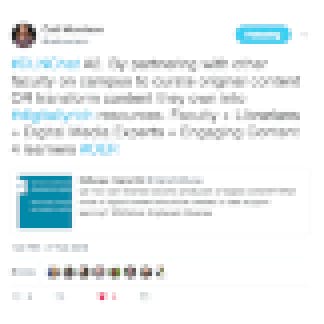Will we wander through VR stacks in the library of the future? Will the library’s computer lab become a makerspace? Those were just a couple of the questions raised on Tuesday, February 27 when the #DLNchat community got together to discuss: What Is the Role of Libraries in Digital Learning Innovation? The conversation was guided by special guest Steven Bell, Associate Librarian at Temple University Libraries, where he works with colleagues on a number of digital learning initiatives. His work has shown him that “it will definitely be a more sustainable initiative if it is collaborative—-whether it's OER, open access journals, etc...if the library wants to go alone it will go fast but if it goes with others it will go much further.”
The #DLNchat community concurred there are ample opportunities for library-led collaborations in digital learning across campus. “Curation is key,” tweeted Trish Briere, “but some good education on digital rights is also very helpful.” And Digital Learning, Research & Instruction Librarian Robin Ashford shared this approach at George Fox University: “Identifying quality OER, helping faculty & students author open textbooks or purchasing library ebooks to replace costly textbooks is how I work developing our textbook affordability program.” OERs are often undervalued compared to their paid counterparts, posited Blake Gore of Vanderbilt University and Tanya Spilovy thinks librarians can help. “Librarians are trusted by faculty and students to help spot quality resources. Libraries can help with the issue of quality.”

Librarian expertise can be utilized beyond curation to support the creation of new OER, videos, courseware, games, AR and other digital content. Cali Morrison envisions libraries “partnering with other faculty on campus to curate original content or transform content they own into digitally rich resources.” If math is more your language, she broke it down this way: “Faculty + Librarians + Digital Media Experts = Engaging Content 4 learners.” But why stop with faculty and digital media experts? Trish Briere suggests: bring in the artists and storytellers.
Digital content will continue to shift with the rise of AR and VR and libraries will shift along with it. “Immersive environment exploration is a good start, say with a library guide, and workshops that create opportunities to develop AR/VR content follows, better yet,” says Cyril Oberlander, University Library Dean at Humboldt State. Imagining a future where AR and education are heavily intersected, as illustrated in the novel and upcoming movie Ready Player One, got some chatters thinking about the library as home for such endeavors. Ed Garay tweeted, “Instead of students visiting the library to check the card catalog or check out a text book, they should be able to get quick guidance to immerse themselves into a EVL CAVE-like virtual reality experience or augmented reality activity to reinforce some learning.”

An AR immersion studio is one option for physical library space in the future. As more stacks move into the cloud, there are many options. The #DLNchat community named a few: learning commons, makerspaces, research showcase experiences and space for interdisciplinary discovery among faculty. Blake Gore went so far as to ask, “Does a library need to be a centralized physical space anymore? It's interesting to think about how librarians might serve more as consultants who meet teams where they are across campus and help them solve problems in their own settings.” Ryan Ingersoll, Dean of Libraries replied that at George Fox University they are considering exactly that-how to create “librarians on demand” to meet students and faculty in dining halls, coffee shops, study lounges or wherever they may be conducting their scholarly work.
However libraries evolve, research shows they will continue to support student performance and retention. Future data may look a little different than the numbers we’re used to. Special guest Steven Bell believes “the direction academic libraries are going in is to tell stories that show impactful results for students and faculty.” Storytelling as data—-how appropriate for a library assessment.

Want to read more from this #DLNchat or jump in on the conversation? You can peruse #DLNchat on Twitter or check out our index of past #DLNchats for some “serendipitous discovery.”
Join the Digital Learning Network to stay up to date on all events and the latest news for higher ed digital learning leaders! At our next #DLNchat, we’ll discuss How Can Video Best Support Learning and Instruction? Add it your Google calendar for Tuesday, March 13 at 1pm PT/ 4pm ET. #DLNchat is co-hosted by the Online Learning Consortium, WCET and Tyton Partners.


